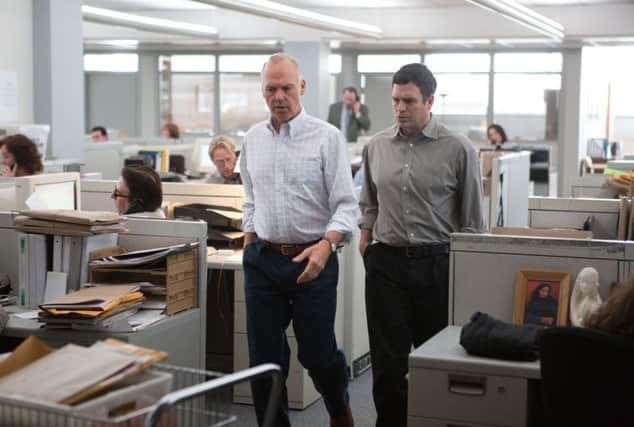Mark Ruffalo: Why I had to leave LA to further my career


It wasn’t long ago that Mark Ruffalo abandoned the L.A. scene and fled to New York.
He rebelled at becoming a commodity, preferring to focus on just being an actor. Thus this is the man who occupies part of the Marvel ensemble – he plays Bruce Banner, aka the Incredible Hulk – whilst simultaneously carving a career in movies that mean something.
Advertisement
Hide AdAdvertisement
Hide AdIt’s for movies like The Kids are All Right and Foxcatcher that the 48-year-old father of three picked up Oscar nominations as best supporting actor. Now he’s up for another, having bagged a third best supporting actor nod for playing real-life journalist Mike Rezendes in Spotlight.
There are those in the biz who are quietly rooting for Spotlight to nab the Oscar for best picture and for Ruffalo to be third time lucky in a category in which he’s been a fixture in recent years.
But that’s still a month away. In the meantime there is Spotlight. The film has been rightly acclaimed as a straight-retelling of an investigation by the Spotlight team at the Boston Globe, which uncovered decades of child abuse by Catholic priests in the city and the cover-up that resulted.
Ruffalo leads a solid cast that includes Rachel McAdams, Michael Keaton (playing Walter ‘Robby’ Robinson), Liev Schreiber and John Slattery. Moreover his character, investigative reporter Mike Rezendes, was alive, available and on hand to give added veracity to the film.
Advertisement
Hide AdAdvertisement
Hide Ad“I’ve always had a healthy respect for the Press,” he says as Rezendes looks on. “I’m kind of a news junkie. But what I learned from working with Mike and the Boston Globe people was what a deep commitment it takes and what it costs to do it.”
He talks of Rezendes’ “immense humanity” in confronting such an issue and praises the way he did it.
“I sat at his side for days watching him work the story, hearing him on the phone, hearing him interview people and I was fascinated by how much space he left for people even on the wrong side of the story to be able to right themselves.
“He convinced people to do stuff that wasn’t directly within their interests. That was remarkable. And that wasn’t my general perception of a dogged reporter. Mike was gentle on the people and hard on the problem. I thought that that was a fantastic approach.”
Advertisement
Hide AdAdvertisement
Hide AdRezendes, who won a Pulitzer Prize for his work on the case, recalls the moment when he realised his investigation was about to start a domino effect.
“I was doing research into the priest who opened the series. After I learned that he had molested more than 150 children in six different parishes over 30 years with the knowledge of his superiors in the Boston Arch Diocese, I looked up his assignment at his very last parish after 30 years of molesting children. And I found that his last assignment was to be in charge of the altar boys. That, I felt, was just so depraved. I couldn’t understand how that could possibly happen. And it was that moment when I told myself, ‘This is going to be a really big story.’”
Ruffalo feels the burden of responsibility. He dismisses what he calls “the gossip stuff” as “a snack for people. I don’t think they really take it to heart’. Real journalism demands a respectful treatment in a serious film.
He references the two sides of his career and is comfortable enough to be able to draw the comparisons without seeming to look down on or belittle the studio behemoths – The Avengers and its sequel, and the forthcoming Thor: Ragnarok – that have spread his talent to wider (and younger) audiences.
Advertisement
Hide AdAdvertisement
Hide Ad“Listen, I’m in the entertainment business and we get to make different kinds of movies. Some are just purely for entertainment and then sometimes you make a movie that just pushes the culture to a particular place.
“I read the script and immediately felt, ‘This is a story that we have heard but it’s time to revisit it again and the culture’s ready to revisit it. We have this new pope and there’s a space open for this to really resonate in the world.’
“And it’s in those moments where film is used as a tool to teach, I think, and to coalesce ideas. It’s just a great honour to be in the right place at the right time to be able to be part of that dialogue. It doesn’t happen often in a career. It doesn’t even happen that often in filmmaking, where you can really influence the conversation and push an issue in one direction or another. This happened to be one of those moments.”
He’s clearly inspired by the part and what it represents. For those who see Spotlight as representative of journalism at its best, Walter Robinson has some tough words of his own.
Advertisement
Hide AdAdvertisement
Hide Ad“The movie underscores not so much our story but the importance of investigative reporting holding public officials and powerful individuals accountable for their actions.
“Editors at newspapers in America and here in the UK have cut many positions because of the economic calamity caused by the Internet. And they have almost always chosen to cut investigative reporting.
“And in fact if you assess readers’ attitudes at what they want from their news people both in television and print, the first thing on the list almost always is investigative reporting. So editors have been penny wise and pound foolish in cutting this kind of resource from newspapers and they outta damn well smarten up.”
Spotlight (15) is on saturation release.